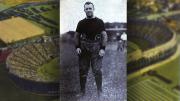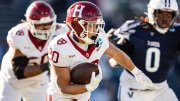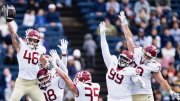This Saturday the Harvard football team was supposed to be visiting Easton, Pennsylvania, to play Lafayette of the Patriot League. Instead, we will have to fill the void with another road trip to yesteryear.
In early November of 2012, a back named Johnny Manziel announced himself to the college football world by leading his team, the Texas A&M Aggies, to a 29-24 victory over defending national champion Alabama.
In early November of 1912, a back named Charlie Brickley announced himself to the college football world by leading his team, the Harvard Crimson, to a 16-6 victory over defending national champion Princeton.
 Great (Gridiron) Performances
Great (Gridiron) Performances
Missing touchdowns? In a season without games, football correspondent Dick Friedman reprises past Crimson glories: epic plays, players, and records. Online weekly at www.harvardmagazine.com/topic/Sports
For Harvard varsity football, 1912 saw the first appearance of the transformational Group of Seven from the class of 1915. During their three seasons of varsity play under coach Percy D. Haughton, A.B. 1899, they would go 25-0-2. The Crimson would be named national champion in ’12 and ’13. Five of the Group of Seven would appear at least once on a Walter Camp All-America team.
Of them all, back Charlie Brickley, out of nearby Everett, Massachusetts, already was a celebrity—not only one of the most heralded schoolboy players produced by the Bay State, but also a baseball star and an Olympian. The previous summer, competing in the Summer Games in Stockholm, he had finished a creditable ninth in what was then called the hop, step, and jump. On the gridiron, Brickley was a marvelous, instinctive all-around player, capable of scoring on offense and defense. But what made him special was his right foot. He was a master of the placekick and especially the dropkick, which was often deployed in those days of the soft, roundish football.
Entering the clash, the Crimson and the Tigers both were both unbeaten. Haughton was fuming to avenge the previous season’s 8-6 loss at Princeton. A sunny, bracing afternoon—perfect football weather—brought some 32,000 fans (including 500 who made the trip from Princeton) to Harvard Stadium. They would be enthralled by lead changes, long gainers, artful kicking, and, if not a plethora of passing (14 attempts total), then the ever-present possibility of the pass—or an interception, of which there were five.
Above all, they were enthralled by Brickley. He was, wrote The New York Tribune, “the rock on which the Tigers split.”
Princeton had the better of the early going. Only the brilliant punting of Harvard’s Sam Felton ’13, including a 65-yard boomer, kept the Tigers at bay. Felton’s 19 punts that day remain the all-time Crimson record. His opposite number, John DeWitt, struggled all day, unable to get a handle on the stadium’s fickle winds. Felton averaged almost 40 yards; DeWitt, punting 18 times, averaged a shade less than 30.
A poor DeWitt punt set up the first score, a 15-yard Brickley dropkick from a difficult angle. But a few minutes later, Princeton riposted spectacularly. Its quarterback, Walter Andrews, completed two passes. The second was a 25-yarder to E.C. Waller. Shaking off Harvard’s Henry Gardner ’13, Waller rolled into the end zone. (This was the first season in which there was an end zone.) The touchdown gave Princeton a 6-3 lead, which it nursed till halftime.
In the third quarter the Crimson again worked the ball down close, and again Brickley dropkicked a field goal, from the 18-yard line. Then came the game’s pivot point. DeWitt punted for Princeton, and Gardner made a fair catch at the Tigers 47. This entitled the Crimson to a free kick. (A rule that still exists today, though teams usually take advantage of it at the end of a half.) Reported the next day’s New York Times, “Gardner, the Harvard quarterback, called to Brickley, and he came running up to do his duty. He tore off his head guard and he wiped the mud and perspiration from his face. The wind blew his raven hair into his eyes, and he rubbed it back from his forehead.”
As the following day’s New-York Tribune described, “Carefully [Brickley] measured the distance; carefully he directed the placing of the ball.” The holder, Huntington Reed “Tack” Hardwick ’15, stretched out on the turf with his finger on top of the ball. “Taking only two short steps, [Brickley] drove it over the goal with the accuracy of a sharpshooter for as pretty a goal as has been seen in many a long day,” said the Tribune. Some accounts said the boot would have been good from 20 yards farther. “There was a kick that will live forever in Harvard history,” said the Times. Harvard 9, Princeton 6.
The Tigers spent the rest of the game bottled up in their own end, smothered by the Crimson defense led by center Derry Parmenter ’13. Desperately they flung passes; four were picked off, one by Brickley, another by Hardwick. Brickley proved to be mortal; he missed three field-goal attempts.
Gradually, inexorably, the Crimson moved closer to the clinching score. Eventually it was first and goal from the Tiger four. Three times quarterback Gardner handed the ball to Brickley, who tried to barge through. He gained a mere yard. Fourth down. A field goal was out: even if successful, it would leave the Tigers within a touchdown.
Then came what soon would come to be recognized as signature Percy Haughton trickeration.
The ball was snapped. Gardner again handed the ball to Brickley, who headed toward the left, followed by every Princeton tackler. But wait...Gardner had held the ball, then slipped it to Hardwick, who charged unmolested into the end zone, then booted the extra point. (Strangely, Haughton usually did not have Brickley kick conversions.) When the final whistle blew, it was Harvard 16, Princeton 6.
Utterly depleted, Brickley staggered off the field. According to the New York Sun, “Brickley was cheered by 30,000 people today in a way that comes to few athletes. Even the men of Princeton were generous enough to applaud this dashing, brilliant player.”
Charles Edward Brickley had arrived in the spotlight. For better and worse, he would never leave it. In 1913, he electrified the nation by kicking five field goals against Yale, accounting for all the Crimson points in Harvard’s 15-5 victory. Had there been a Heisman Trophy that season, “Brick” would have been a runaway winner (as Manziel was in 2012). Though most of Brickley’s senior season was wiped out by an appendectomy, he finished his career with 215 points, a mark not surpassed in the program for 91 years, when it was toppled by running back Clifton Dawson ’07 on his way to 398. (Today Brickley is fifth.) His 13 field goals in 1912 remain the most for a season in Crimson history (tied with three twenty-first-century booters).
After Brickley graduated, he served in the military during World War I. Then he had trouble finding his footing. Perhaps his biggest crime was being born 10 years too early, before the NFL (which was founded in 1920) and the newsreels had made such newly minted football stars as Red Grange instantly marketable. Brickley tried Wall Street, a game for which he had little aptitude. By the end of the 1920s he had completed a journey from acclaim to disgrace, having been convicted of stock manipulation. Despite the formidable efforts of his attorney, William H. Lewis, LL.B. 1895—a former Crimson center who was the first African American All-America—Brickley was sentenced to 15 months in the Charles Street Jail. He served seven months in various prisons, even coaching the baseball team at the Deer Island House of Correction, before he was paroled.
After his release, he led an itinerant existence. For a time, he managed the health club at New York City’s Roosevelt Hotel. (Think of Tom Brady handing out towels at your local gym and you get the idea.) During World War II he worked as a pipefitter’s helper on the 4 p.m.- to-midnight shift at the shipyard in Wilmington, Delaware. He remained a celebrity, a go-to interview especially on the topic of kicking a football.
Brickley’s legal woes rendered him a pariah in the Harvard community. He died of a heart attack in 1949 at age 58. When the Harvard Varsity Club established its Hall of Fame in 1967, he was not in the inaugural class; he wasn’t admitted until 1970.
Brickley is not a member of the College Football Hall of Fame. He has fallen afoul of one of the major criteria for admission: while each nominee’s football achievements are of prime consideration, his post-football record as a citizen is also considered.
Conceding his misdeeds, some of us think that the Hall of Fame should give Charlie Brickley (who, after all, did his time) another look.
AGELESS WONDER: Last Sunday the Miami Dolphins defeated the San Francisco 49ers 43-17 behind three touchdown passes from quarterback Ryan Fitzpatrick ’05. Fitzpatrick completed 22 of 28 attempts for 350 yards. Afterward Dolphin tight end Mike Gesicki tweeted of the 16-season veteran, “The greatest teammate I’ve played with. The thing that makes him special is he makes the guys around him better players. If I could play with him for the next 15 years I would. He’s the man.”
THE SCORE BY QUARTERS
| Princeton | 0 | 6 | 0 | 0 | — | 6 | ||
| Harvard | 0 | 3 | 6 | 7 | — | 16 |
Attendance: 32,000 (approx.)








